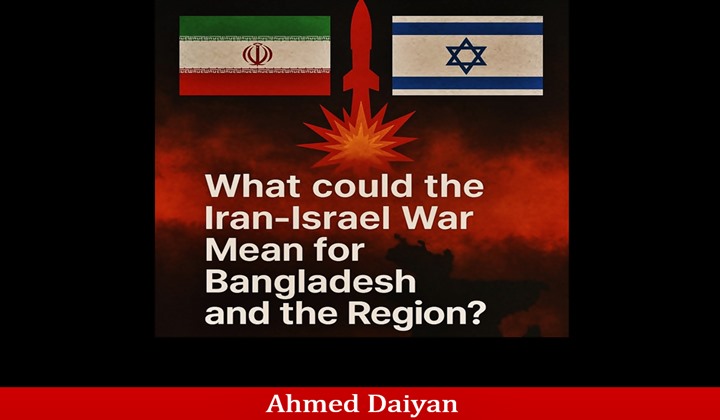■ Ahmed Daiyan ■
As war drums beat between Iran and Israel, the world watches with unease — missiles, red lines, and threats dominate headlines. But beyond the obvious frontlines lies a quieter battleground: South Asia.
While the conflict seems centered on Iran’s nuclear ambitions and Israel’s demand for strategic superiority, a broader pattern is emerging. And if this pattern holds, the aftershocks will not just rattle the Middle East — they will reshape the future of Pakistan, India, and Bangladesh too.
Iran: The West’s Controlled Opponent
To understand what comes next, we must start with what’s already happened.
Despite decades of Anti-Western rhetoric, Iran has not always been the isolated pariah it claims to be. Before the Islamic Revolution of 1979, Iran was a close ally of both the U.S. and Israel. Even after the revolution, Tehran’s actions didn’t always align with its slogans. During the Iran-Iraq war in the 1980s, Iran secretly bought weapons from Israel, with U.S. approval, in what became the infamous Iran-Contra affair.
For years, Iran served a purpose: a regional villain powerful enough to justify American military presence in the Gulf, but not powerful enough to pose an existential threat to Israel. This “controlled opposition” strategy allowed the West to maintain chaos — and with it, control.
But the current war may signal a shift. Israel no longer wants Iran managed — it wants it neutralized. And the U.S., despite its internal divisions, seems aligned in ensuring that Iran never crosses the nuclear threshold.
The war between Iran and Israel is not just about two nations. It’s about shaping the future of the Muslim world, redrawing power maps, and deciding who gets to lead and who must follow. Bangladesh, Pakistan, and other countries in the region must understand this: the guns may be firing in Gaza or Tehran, but the implications will echo through Dhaka, Islamabad, and beyond. This is not fear-mongering. It’s a warning. The map is being redrawn — and Bangladesh must choose where it stands before someone chooses for us.
Why Israel Wants to Be the Only One?
Israel’s national security doctrine is based on one simple idea: never allow another regional power to reach parity.
A nuclear Iran — even a rational one — would break that rule. Not just militarily, but ideologically. It would embolden resistance groups, inspire Islamic movements, and challenge Israel’s status as the region’s sole superpower.
So the war isn’t just about missiles or enrichment levels. It’s about regional hierarchy. And the goal isn’t just to stop Iran’s bombs — it’s to force Iran to bend to a Western-led order, as countries like the UAE and Saudi Arabia have done through normalization deals.
If Iran Falls, Is Pakistan Next?
This is where the stakes become even higher.
Pakistan, unlike Iran, already has nuclear weapons. It also has something else: a deeply rooted Islamic sentiment in its population, a military shaped by decades of anti-India doctrine, and an increasing distance from Western alignment.
If Iran is weakened or brought into submission, the only remaining Muslim nuclear power outside Western control is Pakistan.
Of course, no one is suggesting that Pakistan will be bombed tomorrow. But the strategic logic is clear:
-Destabilization through internal strife
-Pressure via IMF and FATF-like economic tools
-Increased Indian support as a regional counterweight
-Portrayal of Pakistan as a security threat, especially in a post-Afghanistan world
Pakistan may not be the next battlefield — but it may be the next ideological target of isolation and weakening.
Akhand Bharat: From Fantasy to Force
If Pakistan is cornered and Iran neutralised, there is only one regional power that benefits: India.
For decades, Akhand Bharat — the dream of a “Greater India” encompassing present-day Pakistan, Bangladesh, Nepal, and more — was dismissed as a fringe RSS fantasy. But today, it is slowly transforming from ideology to strategy.
Senior members of India’s ruling BJP have spoken openly of this vision. Textbooks and maps circulate showing a unified Indian subcontinent. RSS leaders refer to Bangladesh and Pakistan not as sovereign nations, but as “temporarily separated limbs” of Mother India.
With the West’s blessing and military partnerships with Israel and the U.S., India may see a golden opportunity to assert this vision more aggressively.
Once regional rivals are subdued, what’s left to stop Indian expansionism — ideological, economic, or even military?
A more emboldened India might:
-Escalate pressure on border disputes with Bangladesh and Nepal
-Interfere more deeply in Bangladeshi politics and internal affairs
-Militarize regional ambitions under the guise of counter-terrorism or stability
If history teaches us anything, it’s this: when power is left unchecked, it tends to expand.
What This Means for Bangladesh
Bangladesh often avoids regional power plays. But in a reshaped South Asia, neutrality won’t be an option.
If Pakistan is isolated, Bangladesh will face intense pressure:
-From India, to align more tightly with its strategic goals
-From China, to maintain economic corridors and regional leverage
-From the West, to show its commitment to “democratic stability” and “counter-extremism”
At the same time, rising pro-Palestinian and pan-Islamic sentiments in Bangladesh may clash with its diplomatic balancing act. A political misstep, or a social upheaval, could easily be used as a pretext for foreign involvement — directly or indirectly.
In this high-stakes game, Bangladesh becomes both a prize and a pawn.
The Road Ahead
The war between Iran and Israel is not just about two nations. It’s about shaping the future of the Muslim world, redrawing power maps, and deciding who gets to lead and who must follow.
Bangladesh, Pakistan, and other countries in the region must understand this: the guns may be firing in Gaza or Tehran, but the implications will echo through Dhaka, Islamabad, and beyond.
This is not fear-mongering. It’s a warning. The map is being redrawn — and Bangladesh must choose where it stands before someone chooses for us.
Ahmed Daiyan is the founder, director and CEO at Whistleblowers, lives in Australia

